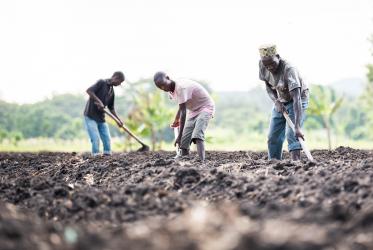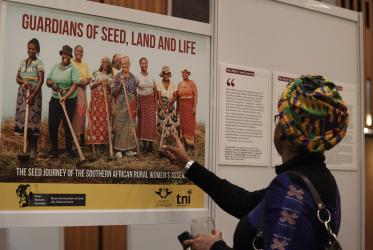By Fredrick Nzwili*
Recent calls for increased action against hunger by church leaders, faith-based humanitarian agencies and development leaders are finding significance as a new report warns of serious levels of under-nutrition in sub-Saharan Africa.
In the region where Christianity is on the upsurge, the latest Global Hunger Index predicts a fall in food production, partly due to higher temperatures, water scarcity and extreme events such as heat waves, droughts and floods, factors related to climate change.
In a past call to action, in 2017, church groups and agencies singled out responding to climate change, resolving conflicts and promoting good governance as some areas they needed to engage vigorously to tackle the hunger.
In Nairobi, Rev. Fidon Mwombeki, general secretary of the All Africa Conference of Churches, said climate change was a key factor contributing to food insecurity. Churches say the phenomenon has altered weather patterns, disrupting farming activities.
“That’s why we are engaged in climate change mitigation,” said Mwombeki. “It is not only climate change but also the issue of population explosion. If churches do not tackle the explosion population in Africa, food security will always be in danger.”
According to the pastor from the Evangelical Lutheran Church in Tanzania, the challenges of food insecurity were felt most at the family level, the reason why the churches needed to focus on sustainable family sizes.
On the ground, churches in the region have continued to urge measures that increase food productivity, food security, nutrition and the resilience of small-scale farmers and pastoralists.
“This has been a concern of the church and its leaders for a long time. There is an aspect about the need for food security in almost everything we do, even with the contribution the faithful make in the church,” said Rev. Joseph Njakai, an Anglican priest in central Kenya. “The church needs the contributions and when there is food, the contributions also are good.”
The churches’ efforts resonate with the Sustainable Development Goals’ commitment to reach Zero Hunger by 2030.
But according to the annual index report titled: “The challenge of Hunger and Climate, is produced by Welthungerhilfe,” a German non-governmental aid organization, the hard-won gains towards the commitment are now under threat or being reserved.
“Conflict, inequality, and the effects of climate change have all contributed to persistently high levels of hunger and food insecurity around the world,” writes Matthew Mogge, Welthungerhilfe general secretary and Dominic MacSorley, Concern Worldwide chief executive officer, in a joint introduction.
Among conflict countries, Central African Republic tops the list with the report classifying it as one country where extremely alarming levels of hunger spread.
“Nearly all the children in Central African Republic are stunted, and 60 percent of the population is undernourished,” says the report.
Since 2012, pro-Christian groups and factions aligned to Islamists in the Central African Republic have fought a civil war triggering a hunger crisis and under nutrition.
In South Sudan, ongoing violence and war has disrupted farming, livelihood activities and trade, leaving at least 7 million hungry.
Faith communities vital in overcoming hunger (WCC press release of 19 March 2020)
*Fredrick Nzwili is a freelance journalist based in Nairobi, Kenya.






